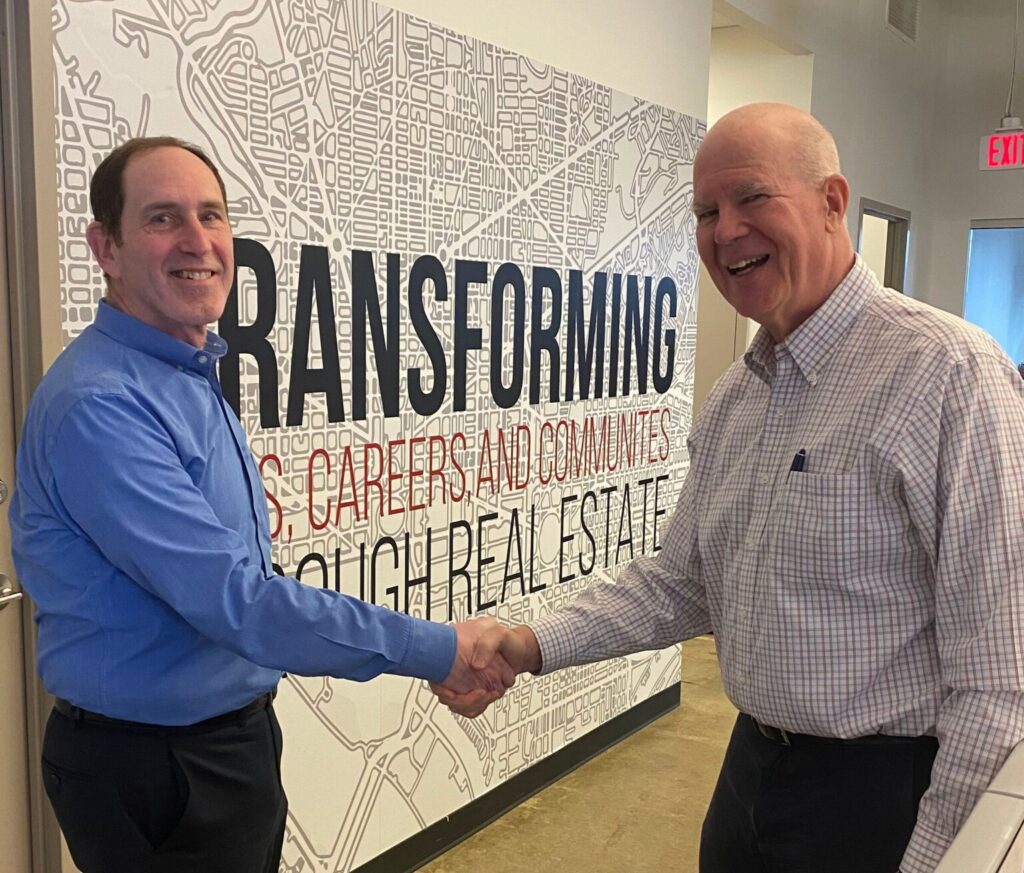

Bio
David Roodberg is President of The Menkiti Group, where he is responsible for overseeing all aspects of the business including development, capital, commercial real estate, and strategic planning. He was formerly the CEO and President of Horning Brothers for over 20 years. He serves on the boards of Greater Washington Community Foundation, Urban Land Institute Executive Committee in DC, Wesley Housing Development Corporation and University of Maryland Masters in Real Estate Advisory Board.
Mr. Roodberg has also been appointed by the Mayor to serve on the Housing Production Trust Fund Board for Washington, DC setting strategies for the City’s investment in affordable housing. Mr. Roodberg has a bachelor’s degree from Duke University and an MBA from the University of Michigan.
Show Notes
- Two decisions: 1. To leave Hornung Brothers and 2. Join The Menkiti Group (5:45)
Origins & Education
- Grew up in suburban NJ in Closter, NJ outside New York (6:15)
- Dad worked in the garment district in NYC
- Dad focused on family and did errands more than other fathers (7:00)
- Mom taught nursery school (7:30)
- In sales selling women’s undergarments (8:00)
- Demerest HS in New Jersey (8:30)
- Focused on academics
- Interested in medicine initially
- Attended Duke University intending to be in pre-med (9:30)
- Took early pre-med courses and realized that it wasn’t for him (10:00)
- Transitioned to computer science because he liked math and programming (10:50)
- Used punch cards and terminals (11:20)
- Counselor in Duke computer camp and was a TI in computer classes (12:00)
- Subsequently attended the Ross Business School at the University of Michigan (13:30)
- Liked the concept of business and finance (14:30)
- Strong school willing to take students right out of undergraduate school
- While there he interviewed tech companies in California and failed all 11 interviews he had with prospective employers and felt it was a lesson in learning interpersonal relationships (16:00)
- Called it a “good failure” and learned from it (16:30)
- Took Dale Carnegie classes to overcome
Career Start
- Found a job with EDS in Dallas, TX and quickly learned this was not a career he wanted to pursue (17:30)
- Started in Dallas then moved to Detroit and finally Rockville, MD (17:45)
- Hated his job (18:45)
- Subsequently joined Perpetual Savings Bank in various roles for over two years (19:00)
- Realized then he wanted to something other than banking
Combined Properties
- Heard about the opportunity with Combined Properties in real estate from a friend (20:45)
- His boss when he first started asked him to do a CAM reconciliation (21:15)
- Ron Haft was the President then and is now the Chairman of Combined Properties (22:00)
- Was there for 11 years beginning as Financial Analyst then promoted to Treasurer (22:10)
- Became CFO in 1991 and was converting lines of credit into longer term loans (22:30)
- Challenges brought opportunity- acquired a shopping center at a discount to cost (23:15)
- Haft Family owned the company- Family dispute among members of family
- Herb, the Father/Patriarch and his son Ron was one side and the other son, Robert, and daughter, Linda, were the other side (24:40)
- Kathy Bonnafe was there and dealt with the bankruptcy and dealings with lenders
- Herbert Haft negotiated by intimidation. He recalled a settlement that broke down and Herb was trying to be tough with him and got a call at 1am from Herb who screams at him and threatened him if he didn’t follow his direction (25:45)
- He testified on the family issues (27:45)
- From 1993-1997 he prevailed through the family dispute (28:15)
- Ron, who maintained his role, began being interested in tech investments (29:00)
- He left in early 2000 to join one of the tech firms and then joined another one, yet neither worked out and learned about the sector, but realized he didn’t fit in there (29:30)
Horning Brothers
- Joined them in 2002 due to community orientation and bonded on nonprofits accordingly (31:00)
- NFTE– Network for Teaching Entrepreneurship (32:10)
- Learned about it when he was at Combined
- His entree back into the real estate industry (33:15)
- Really enjoyed his experience there (33:45)
- Horning Brothers is predominantly residential and is more “people oriented” than at Combined in retail (34:20)
- Comparison of scale- pretty similar between Combined and Horning Brothers (35:15)
- 3M s.f. of retail at Combined
- 4,000 units and 400,000 s.f. commercial at Horning
- Expanded relationships with lenders including HUD, FNMA and Freddie Mac
- HUD financing (36:30)
- Challenges at Hornung Brothers when he came in (37:30)
- Joe Hornung was “old school” on business processes and was construction oriented (37:40)
- He tried to create more of a culture and add technology to the company (38:00)
- Was vertically integrated and included construction initially but ended that business as they didn’t have enough projects (38:40)
- Scale of portfolio growth
- Slow growth as they didn’t use other people’s capital (39:20)
- Tivoli Theatre mixed use project (39:40)
- Stanton Commons– Martha’s Table headquarters (39:50)
- Last acquisition was a 100K warehouse for redevelopment into residential properties (40:00)
- Lens to new business was more conservative with their own capital (40:45)
- Kept things “in house” (41:30)
- Saratoga Apartments were new in the late 1980s (42:45)
- Rent control constrained growth (43:00)
- Project in Frederick, MD (43:45)
- Acquired a property in Silver Spring, MD (44:00)
- Always long term holder (44:15)
- Left Horning Brothers and gave 18 months notice to transition (44:30)
- References Kathy Bonnafe having a similar role as a non-family member CEO (45:00)
- Unsure what he wanted to do (46:15)
The Menkiti Group
- He mentored Bo Menkiti after being introduced to him by Joe Horning (46:50)
- Became good friends with Bo while at Hornung Brothers (47:00)
- Bo Menkiti is “terrific” and grew up in Boston, MA (48:00)
- Came to DC to work at the Corporate Executive Board
- Bought income properties on his own (48:15)
- “One of the most amazing rainmakers he’s ever met” (48:40)
- Skills complement each other really well (49:10)
- Has known Bo for over 15 years (49:20)
- Spoke with Bo about “advising” yet he was convinced he could come in as President to help Bo (49:45)
- Bo’s strength is bringing in new deals and not as strong at executing and running a business (50:30)
- He realized that he could add value to the company helping Bo run the day to day business (51:00)
- Two sides of the business (52:00)
- Keller Williams franchisee companies- residential brokerage, mortgages, title, etc. (52:10)
- Commercial side of the business (52:50)
- Projects
- David is more involved in this side
- Raising a fund
- Development group (53:50)
- Commercial management only (54:00)
- Development pipeline is 2.8M s.f. (54:20)
- Existing portfolio is smaller than pipeline (54:40)
- “Transforming lives through real estate” (55:20)
- Early adopter in underserved neighborhoods (55:50)
- Timing of projects will determine the growth of the company (56:15)
- Creativity in financing- New Market Tax Credits, OZ financing, creative capital stack with public infusion occasionally (56:45)
- Financing side becomes the critical part of development options
- He is familiar with many creative financing strategies
- Bond Bread Project– Howard University (59:00)
- More traditional debt and equity
- Residential and Hotel (59:45)
- Outsource residential leasing/management
- MLK Gateway 1 and 2 (1:01:00)
- Office and retail
- St. Elizabeth Parcel 7-9 (1:01:20)
- Affordable housing
- Office
- Capable of leading project by themselves
- Partners in The Yards with Brookfield (1:02:30)
- Fund is dedicated for their own projects and investing in firms led by people of color (1:02:40)
- Reference to Amazon’s Affordable Housing Fund (Catherine Buell) (1:04:00)
- He was involved in the Washington Housing Conservancy (on the Board) where Amazon has invested
- Raising capital at the LP level (1:05:30)
- Reference to Amazon’s Affordable Housing Fund (Catherine Buell) (1:04:00)
Non Profit Boards
- Washington Housing Conservancy– Joined them while at Horning Brothers (1:06:00)
- Just stepped down as Chairman
- Joined them after the Stanton project opened and he immediately became Chairman
- Grew portfolio considerably up to 1,500
- Mission was to preserve housing in the path of growth (1:08:45)
- First deal was the project next to National Landing where Amazon invested
- Wesley Housing (1:09:30)
- Martha’s Table (1:09:45)
- Food delivery for homeless
- Market for healthy food for underpriveleged
- Developed their community center in Ward 8
- Greater Washington Community Foundation (1:11:00)
- Being involved in the community is part of his job (1:12:00)
- Allocation of time- most meetings were at night for nonprofit activities (1:14:00)
Cultural Differences between Horning and Menkiti
- Horning was more property management and people oriented (1:15:00)
- Menkiti is more about finding new opportunities and community involvement
- Employees to “make a difference” and are driven and are excited about communities (1:16:15)
- ESG impact through the fund they are raising- focus on impact. (1:17:00)
- Diversity issues- transition from Combined to Horning and Menkiti regarding differences (1:18:00
- “Show you care and having others backs”
- Relationship building is important
- Work with communities
Personal
- Values are very important to his family (1:21:00)
- Being “hands on” is important- making “giving back” a daily priority (1:22:00)
- Working at Horning Brothers made him a better person (1:24:00)
- His relationship with Joe and Lynn Horning was almost like being their son and they made giving back a priority
- ULI experience- Importance of relationships is what he learned there. (1:25:20)
- Loved being a Mentor- University of Maryland program (1:26:00)
- Wins (1:27:00)
- Projects at Horning- Tivoli and Stanton Commons
- Washington Conservancy effort and results
- Losses (1:28:00)
- His interview experiences after graduate school, yet ended up being a better situation over time
- Haft family issues distracted his career
- Surprising is where he is now based on building relationships and how he overcame his shyness and not understanding people skills (1:29:30)
- Advice to his 25 yr. old self is to focus on relationships as most important in life and getting involved in nonprofit organizations (1:31:00)
- Billboard Statements (1:32:00)
- “Make a difference in small ways”
- “Always be open to learning”
Postscript
- Kevin Dean joins me to discuss his ideas
- Impressed by his story and career
- Rare that a President serves along side the founder
- Impact of Combined Properties experience
- Reference to Safeway bid by Haft’s family company Dart Drug to use “greenmail”
- Herbert Haft’s reputation was a “tough” guy
- Switch from real estate to tech during the Dot com explosion era to satisfy his curiosity and realized it was not his real passion
- One chance conversation can change one’s life
- He enjoyed his work at Horning Brothers as “giving back” was important
- Menkiti Group contrasts Horning Brothers in its activity level
- Hunting and Skinning- Finding deals and running a company
- Ability to build relationships
- Real estate is becoming more like a bond…automation
- Relationships will become more important
- Real estate needs to have a reason to exist
- Experience of being there physically is critical
- Relationships are the bottom line
